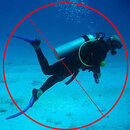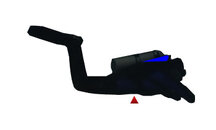Thank you! Is buoyancy and trim just something that comes with lots of practice? We tried to get it right and hover during our OW dives, but when I reached the bottom I would occasionally brush it accidentally. How should I have adjusted to not hit the bottom - added a shot of air to my BCD? Take a deep breath in and try to control my positioning via breathing? I feel like right now I depend too much on inflating / deflating ... should I mostly just be controlling it by my breathing after the initial descent?
As far as the other skills, I guess I'm trying to think of "oh ****" moments that are bound to happen eventually to which beginners may not know how to respond. I saw someone mentioned in another thread about a free-flowing reg that they didn't know how to handle as a newbie, and we did briefly practice this skill but didn't spend a lot of time on it. I can easily see a mask getting kicked off, a reg ripped out of the mouth by an OOA diver and having to grab ahold of them, losing track of air supply as a beginner ... but I'm not as familiar with the equipment so I really don't know if a free-flowing reg is common or what to do if I can't quickly disconnect the LPI hose. I know all of these skills are secondary to breathing control, but we're just trying to get a sense of most valuable "need to know"s before we hop on a dive boat in the Caribbean this winter with a bunch of fellow (and possibly just as inexperienced) tourists all in rented gear!

In reading your first paragraph about buoyancy I sense you have some gaps in the fundamental understanding of buoyancy control. Until that is corrected nothing about the topic is going to make sense. With that understanding it will all be apparent. The one time in your dive when you are apt to not need air in your BC is at the safety stop with a nearly empty air cylinder. At the beginning of your dive you will be "heavy" with about 5 pounds of air that you will be expending. As you go deeper your neoprene will compress and you will lose buoyancy. Unless you are diving in a swimsuit the need to add as as you drop is almost inevitable. There are some old school vintage diving techniques that let you get around some of this but that's another topic. The fact that you made it to the bottom without adding air and did not hit like a dirt dart suggests you weighting is pretty reasonable assuming you can also hold a safety stop at the end of the dive. It's usually best to add air in short bursts keeping in mind that it will take a few seconds for a change in buoyancy to influence your vertical movement. As the bottom approaches you can add air to slow your approach. As you approach your desired depth you can even take a very deep breath, stop like Pinocchio on puppet strings a few feet from the bottom and add a shot of air as you exhale. The average diver can get 4, maybe 5 pounds of buoyancy shift with lung volume. In general it's not a lot of fun to dive with your lungs very full or very empty for an extended period so your BC should carry enough air to keep you in a comfortable range. Also remember that as you descend and add air the BC is being compressed by the water around it so even though you keep adding air it does not all represent nearly as much bladder swell.
Conversely you mention inflating and deflating a lot. It may be beginner fidgeting or is could be a sign of being over weighted. How have you established your weighting?
Here is a procedure.
You seem to be on to a next layer of skills that are certainly worth pursuing and you can fit them all, in as you dive, especially if you get back to the exit with air to spare. I will add one, an empty lung regulator recovery. You have undoubtedly done regulator recovery as a skill. You got to take a nice deep breath, removed your regulator, blew a little stream of bubbles (to indicate and ensure an open airway )retrieved your regulator, purged and went back to breathing. In real life (and it happens) you probably won't have the luxury of stuffing your lungs before your regulator is ripped from your mouth. So, exhale, remove your regulator, put it back purge and inhale. Learning to trust the purge function is essential. Make that first breath gentle, there may be some residual wetness in there.
To your questions, if you go into a free flow especially in warm water it probably means a mechanical problem, not freezing. A full free flow can drain a full tank in a few minutes, sooner on a lesser fill. Getting to the surface is your priority. The preferred method is to head up with your buddy. You can sip air from a free flow (sipping water from a hose) but your time is limited. If it's a minor free flow you can just let it run, the extra air will flow from your exhaust valve. If possible get to your buddy and just do an air share to avoid the chaos. Shutting your cylinder off is a good idea to save the air just in case and to keep the water out. Lacking buddy contact, head up breathing as mentioned or as a last resort perform a buoyant ascent exhaling as you go up.
For the BC connector, find your biggest air dump position it at the high point and hold it wide open. Meanwhile perhaps your buddy can unhook the hose.
Now to your opening question I will not respond with a singular skill. I will suggest that you dive with a spirit of continuous improvement. Every dive is a chance to incrementally work on a dozen little skills and as you master one thing others will come into view. Dive within your skills and seek to execute those dives with excellence. As you master the basics mentoring and/or training will open the doors to new challenges and opportunities for growth. Your configuration will be dynamic for a while. How much weight and where you place it, accessories you chose to carry and where you carry them are all going to evolve. Just be a little critical of your diving and seek to fill those gaps. Remember to have fun.
Pete





